Solucionar problemas de CRL para autenticação baseada em certificado do AnyConnect
Opções de download
Linguagem imparcial
O conjunto de documentação deste produto faz o possível para usar uma linguagem imparcial. Para os fins deste conjunto de documentação, a imparcialidade é definida como uma linguagem que não implica em discriminação baseada em idade, deficiência, gênero, identidade racial, identidade étnica, orientação sexual, status socioeconômico e interseccionalidade. Pode haver exceções na documentação devido à linguagem codificada nas interfaces de usuário do software do produto, linguagem usada com base na documentação de RFP ou linguagem usada por um produto de terceiros referenciado. Saiba mais sobre como a Cisco está usando a linguagem inclusiva.
Sobre esta tradução
A Cisco traduziu este documento com a ajuda de tecnologias de tradução automática e humana para oferecer conteúdo de suporte aos seus usuários no seu próprio idioma, independentemente da localização. Observe que mesmo a melhor tradução automática não será tão precisa quanto as realizadas por um tradutor profissional. A Cisco Systems, Inc. não se responsabiliza pela precisão destas traduções e recomenda que o documento original em inglês (link fornecido) seja sempre consultado.
Contents
Introdução
Este documento descreve como solucionar problemas da lista de certificados revogados (CRL) configurada para autenticação baseada em certificado do AnyConnect.
Pré-requisitos
Requisitos
A Cisco recomenda que você tenha conhecimento destes tópicos:
- autoridade de certificado (CA)
- Public Key Infrastructure (PKI)
- VPN RA em FTD
- Windows 10 com AnyConnect Client
Componentes Utilizados
As informações neste documento são baseadas nestas versões de software:
- CSR1000V - Cisco IOS® XE, versão 16.12.03 - como servidor de CA Cisco IOS XE
- NGFWv - Versão 7.1.0 - como gateway VPN
- AnyConnect Secure Mobility Client versão 4.10.07073- como o cliente VPN
- Windows 10 como um computador local
As informações neste documento foram criadas a partir de dispositivos em um ambiente de laboratório específico. Todos os dispositivos utilizados neste documento foram iniciados com uma configuração (padrão) inicial. Se a rede estiver ativa, certifique-se de que você entenda o impacto potencial de qualquer comando.
Informações de Apoio
A CRL permite que os dispositivos determinem se um certificado foi revogado antes do vencimento do certificado. Uma CRL contém o número de série e a data de revogação do certificado. Um gateway seguro, como os sistemas Firepower Thread Defense (FTD) ou outros dispositivos finais, usa esse recurso para fortalecer a autenticação do certificado, validando o status do certificado.
Topologia
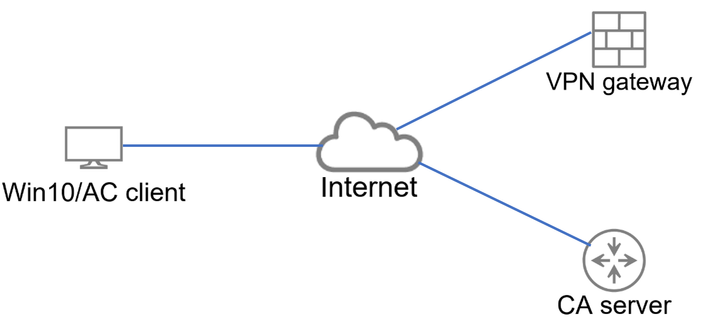 Topologia básica que fornece conectividade ao gateway VPN e ao servidor CA.
Topologia básica que fornece conectividade ao gateway VPN e ao servidor CA.
Configuração importante
Para realizar a autenticação baseada em certificado com CRL, a configuração apresentada foi usada em cada um dos dispositivos envolvidos.
Roteador CA
A Autoridade de Certificação do Servidor é responsável pela emissão de certificados de identidade para os usuários, a fim de fornecer autenticação contra o gateway VPN. Além disso, o roteador armazena o arquivo de banco de dados de CRL e atua como o Ponto de distribuição de CRL (CDP).
Um CDP é onde o gateway VPN e outros usuários finais recuperam as informações de CRL. Essas informações são armazenadas em cache localmente e são válidas somente por um período específico; quando esse tempo expira, é feito o download de uma nova CRL.

Observação: o banco de dados da CRL e o local onde os dispositivos têm acesso à CRL podem estar no mesmo dispositivo. No entanto, por motivos de segurança, é recomendável que a CRL à qual os dispositivos finais acessam seja armazenada em um dispositivo diferente do banco de dados da CRL. Neste exemplo, o roteador CA armazena o banco de dados CRL e atua como CDP para o gateway VPN.
crypto pki server CAS
database level complete
no database archive
issuer-name cn=calo_root,ou=TAC,o=cisco
grant auto
hash sha256
lifetime crl 2
lifetime certificate 300
lifetime ca-certificate 1000
cdp-url http://192.0.2.10/cgi-bin/pkiclient.exe?operation=GetCRL
eku server-auth client-auth
database url ser nvram:
crypto pki trustpoint TP-self-signed-1507329386
enrollment selfsigned
subject-name cn=IOS-Self-Signed-Certificate-1507329386
revocation-check none
rsakeypair TP-self-signed-1507329386
crypto pki trustpoint CAS
revocation-check crl
rsakeypair CAS
interface GigabitEthernet2
ip address 192.0.2.10 255.255.255.0
negotiation auto
ip http server
ntp master 1
Configuração do gateway VPN
O FTD é configurado para fornecer uma VPN de Acesso Remoto aos usuários finais usando certificados como o método de autenticação (somente certificado). Ao receber o certificado de identidade do usuário, o FTD verifica se o certificado foi emitido por uma autoridade de certificação (CA) conhecida e confirma sua validade obtendo a CRL do CDP definido no certificado.
tunnel-group local type remote-access
tunnel-group local general-attributes
address-pool AC_pool
default-group-policy local_gp
username-from-certificate use-entire-name
tunnel-group local_test webvpn-attributes
authentication certificate
group-alias test enable
Dispositivo Windows
Um certificado de identidade foi emitido pelo servidor da autoridade de certificação e instalado no dispositivo Windows.
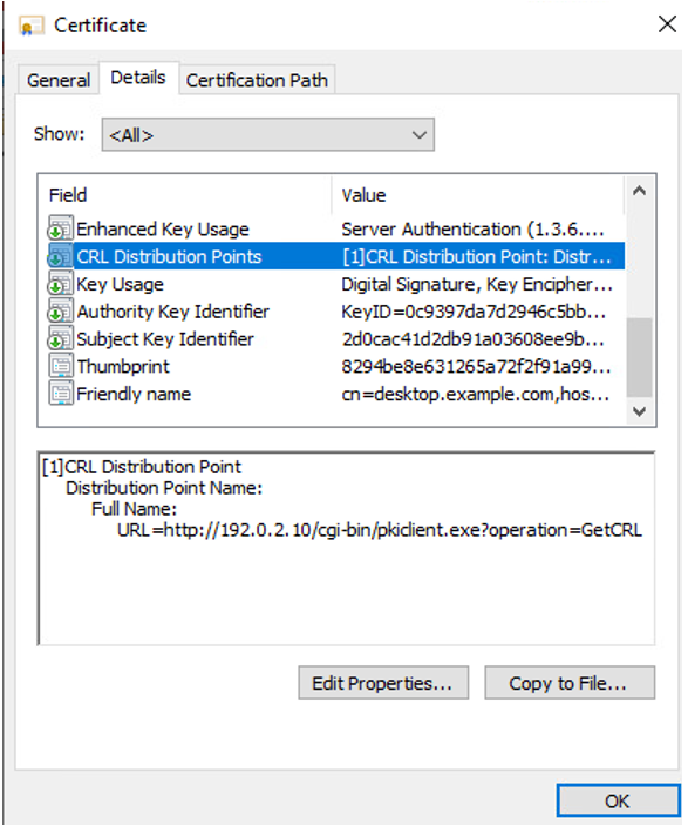
Validação
As próximas depurações e capturas exibem a diferença entre um usuário que usa um certificado válido (cenário de trabalho) e um usuário que usa um certificado que foi revogado (cenário de não trabalho).
Cenário 1. O certificado é válido para autenticação
Quando o usuário inicia a tentativa de conexão, ele fornece ao FTD seu certificado de identidade, o gateway de VPN verifica se o emissor é uma autoridade conhecida e começa a solicitar a CRL do CDP definido no certificado de identidade através da solicitação HTTP/GET. O servidor CA responde com a CRL e o FTD verifica se o número de série do certificado está listado. Como a CRL está vazia (nenhum certificado revogado), o FTD aceita o certificado como válido e permite que o usuário se autentique.
PKI[7]: Cert to verify
PKI[7]: ---------Certificate--------:
Serial Number: 2 (0x2)
Issuer: O=cisco, OU=TAC, CN=calo_root
Subject: CN=desktop.example.com/unstructuredName=CA-router
PKI[12]: pki_verify_cb, pki_ossl_validate.c:358
PKI[8]: val status=1: cert subject: /O=cisco/OU=TAC/CN=calo_root. ctx->error: (0)ok, cert_idx: 1
PKI[12]: pki_verify_cb, pki_ossl_validate.c:358
PKI[8]: val status=1: cert subject: /CN=desktop.example.com/unstructuredName=CA-router. ctx->error: (0)ok, cert_idx: 0
PKI[8]: pki_ossl_find_valid_chain took 217 microsecs
PKI[6]: Verified chain:
PKI[14]: pki_ossl_get_cert_summary, pki_ossl.c:119
PKI[6]: ---------Certificate--------:
Serial Number: 2 (0x2)
Issuer: O=cisco, OU=TAC, CN=calo_root
Subject: CN=desktop.example.com/unstructuredName=CA-router
PKI[14]: pki_ossl_get_cert_summary, pki_ossl.c:119
PKI[6]: ---------Certificate--------:
Serial Number: 1 (0x1)
Issuer: O=cisco, OU=TAC, CN=calo_root
Subject: O=cisco, OU=TAC, CN=calo_root
[..output ommitted]
CRYPTO_PKI: bitValue of KEY_USAGE = a0PKI[7]: CRYPTO_PKI:check_key_usage: Checking KU for case VPN peer certs.
PKI[7]: CRYPTO_PKI:check_key_usage: KU bit digitalSignature is ON.
PKI[7]: ExtendedKeyUsage OID = serverAuth NOT acceptable for usage type SSL VPN Peer
PKI[7]: ExtendedKeyUsage OID = clientAuth acceptable for usage type: SSL VPN Peer
PKI[7]: check_key_usage:Extended Key/Key Usage check OK
PKI[12]: pki_ossl_revocation_check, pki_ossl_validate.c:931
PKI[7]: Starting revocation check for session 0x06c8d45f
PKI[12]: pki_init_revocation, pki_ossl_revocation.c:162
PKI[12]: pki_ossl_eval_revocation, pki_ossl_validate.c:699
PKI[7]: Evaluating session revocation status, 1 certs to check
PKI[8]: session 0x06c8d45f, cert 0 has rev_status 0, using methods 1/3/0 at index 0
PKI[12]: cert_revoc_exempt, pki_ossl_revocation.c:250
PKI[13]: get_tp_from_policy, pki_ossl_policy_transition.c:230
PKI[11]: polinfo->name: CRL-AC
PKI[11]: tp label: Trustpool
PKI[13]: label: CRL-AC
PKI[13]: pki_crl_cached, pki_ossl_crl_cache.c:1351
PKI[13]: get_tp_from_policy, pki_ossl_policy_transition.c:230
PKI[11]: polinfo->name: CRL-AC
PKI[11]: tp label: Trustpool
PKI[13]: label: CRL-AC
PKI[12]: pki_ossl_check_cache, pki_ossl_crl_cache.c:1269
PKI[7]: Starting OSSL CRL cache check.
PKI[12]: pki_ossl_crypto_build_crldp_list, pki_ossl_crl_cache.c:326
PKI[12]: pki_get_der_cdp_ext, crypto_pki.c:1528
PKI[14]: url_type_allowed, pki_ossl_crl_cache.c:153
PKI[9]: Attempting to find cached CRL for CDP http://192.0.2.10/cgi-bin/pkiclient.exe?operation=GetCRL
PKI[12]: pki_ossl_SelectCRLByIssuerTimeDER, pki_ossl_crl_cache.c:1219
PKI[14]: pki_ossl_get_name_string, pki_ossl.c:315
PKI[9]: Select DER crl(O=cisco, OU=TAC, CN=calo_root)
PKI[12]: pki_ossl_get_crl_internal, pki_ossl_crl_cache.c:506
PKI[7]: CRL not cached. Initiating CRL download for cert idx 0.
PKI[12]: do_get_crl, pki_ossl_revocation.c:85
PKI[9]: starting CRL FSM #0
PKI[11]: drive_fsm, pki_ossl_revocation.c:33
PKI[8]: [Sess: 0x06c8d45f, Cert: 0] FSM: In PKICRL_InitTransaction
PKI[12]: get_cdps, pki_crl_fsm_act.c:202
PKI[13]: get_tp_from_policy, pki_ossl_policy_transition.c:230
PKI[11]: polinfo->name: CRL-AC
PKI[11]: tp label: Trustpool
PKI[13]: label: CRL-AC
PKI[12]: pki_ossl_crypto_build_crldp_list, pki_ossl_crl_cache.c:326
PKI[12]: pki_get_der_cdp_ext, crypto_pki.c:1528
PKI[14]: url_type_allowed, pki_ossl_crl_cache.c:153
PKI[7]: cdp: (len=58, type=URI, prot=HTTP) http://192.0.2.10/cgi-bin/pkiclient.exe?operation=GetCRL
PKI[8]: [Sess: 0x06c8d45f, Cert: 0] FSM: PKICRL_InitTransaction, Return status: 0
PKI[8]: [Sess: 0x06c8d45f, Cert: 0] FSM: In PKICRL_NextCDP
PKI[12]: crldl_cdp_blacklisted, pki_ossl_crl.c:1374
PKI[12]: crl_find_pending_crl, pki_ossl_crl.c:1155
PKI[13]: get_pending_crl_list, pki_ossl_crl.c:1101
PKI[13]: crypto_pki_get_ossl_env, pki_ossl.c:42
PKI[14]: cmp_cdp_info, pki_ossl_crl.c:1121
PKI[14]: cmp_cdp_info, pki_ossl_crl.c:1121
PKI[14]: cmp_cdp_info, pki_ossl_crl.c:1121
PKI[7]: CDP is not blacklisted
PKI[8]: [Sess: 0x06c8d45f, Cert: 0] FSM: PKICRL_NextCDP, Return status: 0
PKI[8]: [Sess: 0x06c8d45f, Cert: 0] FSM: In PKICRL_Request
PKI[13]: crldp_download_pending, pki_ossl_crl.c:1184
PKI[12]: crl_find_pending_crl, pki_ossl_crl.c:1155
PKI[13]: get_pending_crl_list, pki_ossl_crl.c:1101
PKI[13]: crypto_pki_get_ossl_env, pki_ossl.c:42
PKI[14]: cmp_cdp_info, pki_ossl_crl.c:1121
PKI[14]: cmp_cdp_info, pki_ossl_crl.c:1121
PKI[14]: cmp_cdp_info, pki_ossl_crl.c:1121
PKI[8]: session 0x06c8d45f adding pending CRL entry for cert 0
PKI[12]: crldp_add_pending_download, pki_ossl_crl.c:1203
PKI[12]: crl_find_pending_crl, pki_ossl_crl.c:1155
PKI[13]: get_pending_crl_list, pki_ossl_crl.c:1101
PKI[13]: crypto_pki_get_ossl_env, pki_ossl.c:42
PKI[14]: cmp_cdp_info, pki_ossl_crl.c:1121
PKI[14]: cmp_cdp_info, pki_ossl_crl.c:1121
PKI[14]: cmp_cdp_info, pki_ossl_crl.c:1121
PKI[13]: get_pending_crl_list, pki_ossl_crl.c:1101
PKI[13]: crypto_pki_get_ossl_env, pki_ossl.c:42
PKI[12]: retrieve_crl, pki_crl_fsm_act.c:233
PKI[13]: get_tp_from_policy, pki_ossl_policy_transition.c:230
PKI[11]: polinfo->name: CRL-AC
PKI[11]: tp label: Trustpool
PKI[13]: label: CRL-AC
PKI[7]: CDP type HTTP
PKI[7]: getting http://192.0.2.10/cgi-bin/pkiclient.exe?operation=GetCRL
PKI[12]: pki_ossl_crl_build_http_io, pki_ossl_crl.c:1017
PKI[13]: pki_parse_uri, pki_ossl_uri.c:75
PKI[14]: pki_uri_map_protocol, pki_ossl_uri.c:17
PKI[14]: pki_uri_get_port, pki_ossl_uri.c:34
PKI[13]: pki_free_uri, pki_ossl_uri.c:57
PKI[11]: pki_crl_request_send_async, pki_ossl_crl.c:627
PKI[8]: [15] IOCB allocated
PKI[7]: PKI CRL I/O request queue result: IO_STATUS_QUEUED
PKI[8]: [Sess: 0x06c8d45f, Cert: 0] FSM: PKICRL_Request, Return status: 0
PKI[7]: Chain revocation status: good: 0, exempt: 0, cached: 0, revoked: 0, error: 0, pending: 1, fail-allow: 0
PKI[9]: Async unlocked for session 0x06c8d45f
PKI[8]: [15] Received IO request msg
PKI[8]: [15] DNS resolve issued for 192.0.2.10
PKI[9]: CERT API thread sleeps!
PKI[7]: [15] DNS resolve 192.0.2.10 (192.0.2.10)
PKI[8]: [15] Socket open success
PKI[8]: [15] IPv4 Route lookup to 192.0.2.10 use interface outside
PKI[8]: [15] Connect sent to 192.0.2.10 from 192.0.2.1
PKI[12]: pki_io_cbfunc_log_revocation_check, pki_ossl_revocation.c:421
PKI[7]: 6717056: Attempting CRL revocation check from outside:192.0.2.1/62075 to 192.0.2.10/80 using HTTP.
PKI[8]: [15] Received Socket transmit ready msg
----- Begin Data Type:HTTP Request [15]
Length: 76 -----
47 45 54 20 2f 63 67 69 2d 62 69 6e 2f 70 6b 69 | GET /cgi-bin/pki
63 6c 69 65 6e 74 2e 65 78 65 3f 6f 70 65 72 61 | client.exe?opera
74 69 6f 6e 3d 47 65 74 43 52 4c 20 48 54 54 50 | tion=GetCRL HTTP
2f 31 2e 30 0d 0a 48 6f192.0.2.10 73 74 3a 20 31 39 32 2e | /1.0..Host: 192.
31 38 31 2e 33 2e 31 30 0d 0a 0d 0a | 0.2.10....
----- End Data Type:HTTP Request [15]
Length: 76 -----
PKI[8]: [15] Sent 76 bytes
PKI[8]: [15] Received Socket read ready msg
PKI[8]: [15] read 662 bytes
PKI[8]: [15] Read EOF
PKI[12]: pki_io_cbfunc, pki_crl_fsm_act.c:59
PKI[7]: Callback received for vcid: 0, sess_id: 0x06c8d45f, cert_idx: 0, status: IO_STATUS_OK(1), datalen: 662
PKI[13]: get_fsm_data, pki_ossl_revocation.c:446
PKI[7]: [15] IOCB freed
PKI[13]: CERT_API_QueueFSMEvent, vpn3k_cert_api.c:137
PKI[13]: CERT_API_req_enqueue, vpn3k_cert_api.c:2913
PKI[9]: CERT API thread wakes up!
PKI[12]: CERT_API_Q_Process, vpn3k_cert_api.c:2811
PKI[12]: CERT_API_process_req_msg, vpn3k_cert_api.c:2746
PKI[8]: process msg cmd=2, session=0x06c8d45f
PKI[9]: Async locked for session 0x06c8d45f
PKI[11]: pki_notify_fsm_evt, pki_ossl_revocation.c:56
PKI[11]: drive_fsm, pki_ossl_revocation.c:33
PKI[8]: [Sess: 0x06c8d45f, Cert: 0] FSM: In PKICRL_ProcessResp
PKI[13]: pki_ossl_util_find_http_payload, pki_ossl_utils.c:36
PKI[8]: Received CRL of length 249 for session 0x06c8d45f, cert idx 0
PKI[13]: get_tp_from_policy, pki_ossl_policy_transition.c:230
PKI[11]: polinfo->name: CRL-AC
PKI[11]: tp label: Trustpool
PKI[13]: label: CRL-AC
PKI[12]: pki_ossl_crl_add_to_cache, pki_ossl_crl_cache.c:1177
PKI[12]: pki_ossl_crypto_verify_and_insert_crl, pki_ossl_crl_cache.c:1126
PKI[12]: pki_ossl_insert_der_crl_int, pki_ossl_crl_cache.c:1017
PKI[8]: Inserting CRL
PKI[14]: pki_ossl_get_crl_summary, pki_ossl.c:151
PKI[8]: ---------CRL--------:
Certificate Revocation List (CRL):
Version 1 (0x0)
Signature Algorithm: sha1WithRSAEncryption
Issuer: /O=cisco/OU=TAC/CN=calo_root
Last Update: Sep 24 22:18:38 2023 GMT
Next Update: Sep 25 00:18:38 2023 GMT
No Revoked Certificates.
[..outout ommitted]
PKI[7]: Evaluating session revocation status, 1 certs to check
PKI[8]: session 0x06c8d45f, cert 0 has rev_status 3, using methods 1/3/0 at index 0
PKI[7]: Chain revocation status: good: 0, exempt: 0, cached: 1, revoked: 0, error: 0, pending: 0, fail-allow: 0
PKI[7]: session: 0x06c8d45f, all revocation processing complete
PKI[5]: session: 0x06c8d45f, CRL for certificate 0 has been cached
PKI[12]: pki_ossl_rebuild_ca_store, pki_ossl_certstore.c:194
PKI[13]: crypto_pki_get_ossl_env, pki_ossl.c:42
PKI[12]: pki_ossl_crl_add_cache_to_store, pki_ossl_crl_cache.c:1396
PKI[9]: OSSL certstore updated with 0 certs, 1 CRLs and 0 policies, 0 certs added to stack
PKI[7]: session 0x06c8d45f, Starting chain validation with cached CRL checking
PKI[12]: pki_ossl_find_valid_chain, pki_ossl_validate.c:472
PKI[9]: Begin sorted cert chain
PKI[14]: pki_ossl_get_cert_summary, pki_ossl.c:119
PKI[9]: ---------Certificate--------:
Serial Number: 1 (0x1)
Issuer: O=cisco, OU=TAC, CN=calo_root
Subject: O=cisco, OU=TAC, CN=calo_root
PKI[14]: pki_ossl_get_cert_summary, pki_ossl.c:119
PKI[9]: ---------Certificate--------:
Serial Number: 2 (0x2)
Issuer: O=cisco, OU=TAC, CN=calo_root
Subject: CN=desktop.example.com/unstructuredName=CA-router
PKI[9]: End sorted cert chain
PKI[13]: pki_ossl_get_store, pki_ossl_certstore.c:61
PKI[12]: pki_ossl_rebuild_ca_store, pki_ossl_certstore.c:194
PKI[13]: crypto_pki_get_ossl_env, pki_ossl.c:42
PKI[13]: crypto_pki_get_ossl_env, pki_ossl.c:42
PKI[14]: pki_ossl_get_cert_summary, pki_ossl.c:119
PKI[9]: Cert to verify
PKI[9]: ---------Certificate--------:
Serial Number: 2 (0x2)
Issuer: O=cisco, OU=TAC, CN=calo_root
Subject: CN=desktop.example.com/unstructuredName=CA-router
PKI[12]: pki_verify_cb, pki_ossl_validate.c:358
PKI[8]: val status=1: cert subject: /O=cisco/OU=TAC/CN=calo_root. ctx->error: (0)ok, cert_idx: 1
PKI[12]: pki_verify_cb, pki_ossl_validate.c:358
PKI[8]: val status=1: cert subject: /CN=desktop.example.com/unstructuredName=CA-router. ctx->error: (0)ok, cert_idx: 0
PKI[8]: pki_ossl_find_valid_chain took 167 microsecs
PKI[7]: session 0x06c8d45f, Validation with CRL checking completed, status 0
PKI[7]: session 0x06c8d45f, Revocation check complete, no revoked certs found
PKI[12]: pki_ossl_do_callback, pki_ossl_validate.c:164
PKI[13]: CERT_Close, vpn3k_cert_api.c:291
PKI[8]: Close session 0x06c8d45f asynchronously
PKI[13]: CERT_API_req_enqueue, vpn3k_cert_api.c:2913
PKI[9]: Async unlocked for session 0x06c8d45f
PKI[8]: No IOCB found for SOCKET CLOSE message, handle 0x5dba666
PKI[12]: CERT_API_Q_Process, vpn3k_cert_api.c:2811
PKI[12]: CERT_API_process_req_msg, vpn3k_cert_api.c:2746
PKI[8]: process msg cmd=1, session=0x06c8d45f
PKI[9]: Async locked for session 0x06c8d45f
PKI[9]: Async unlocked for session 0x06c8d45f
PKI[13]: pki_ossl_free_valctx, pki_ossl_validate.c:251
PKI[13]: free_fsm_data, pki_ossl_revocation.c:225
PKI[13]: ocsp_free_fsmdata, pki_ossl_ocsp.c:1462
PKI[13]: free_fsm_data, pki_ossl_revocation.c:225
PKI[13]: ocsp_free_fsmdata, pki_ossl_ocsp.c:1462
PKI[9]: CERT API thread sleeps!
PKI[13]: CERT_GetGroupFromSSLRule, vpn3k_cert_api.c:1672
A próxima captura de FTD exibe a transação HTTP entre o FTD e o CDP (servidor CA neste caso) para recuperar a CRL.
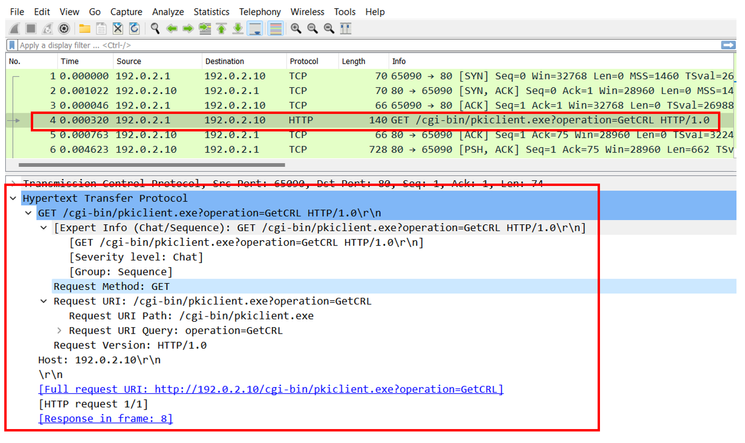
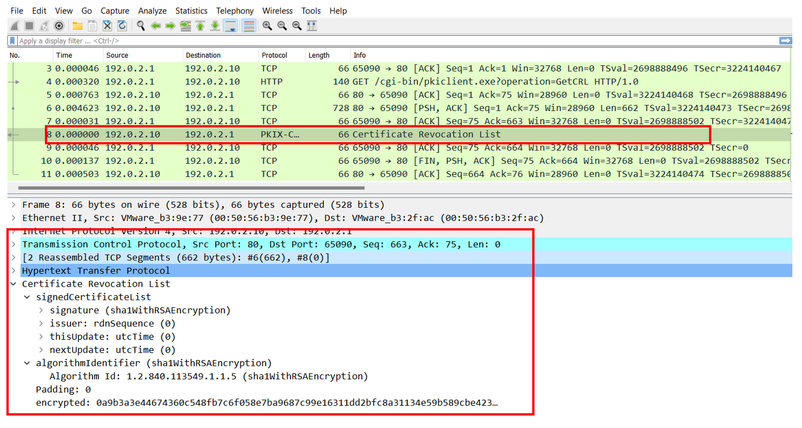
Cenário 2. O certificado é revogado e a autenticação falha
Um certificado de identidade é revogado no servidor da autoridade de certificação e registrado no arquivo de banco de dados da CRL. No entanto, a CRL atualizada não estará disponível para o FTD até que a CRL atual expire (configurada para ser válida por duas horas).
CA-router#show crypto pki server CAS crl
Certificate Revocation List:
Issuer: cn=calo_root,ou=TAC,o=cisco
This Update: 22:18:38 UTC Sep 24 2023
Next Update: 00:18:38 UTC Sep 25 2023
Number of CRL entries: 0
CRL size: 249 bytes
CA-router#show crypto pki server CAS certificates
Serial Issued date Expire date Subject Name
1 20:18:36 UTC Sep 24 2023 20:18:36 UTC Jun 20 2026 cn=calo_root ou=TAC o=cisco
2 20:19:33 UTC Sep 24 2023 20:19:33 UTC Jul 20 2024 hostname=CA-router cn=desktop.example.com
3 23:50:58 UTC Sep 24 2023 23:50:58 UTC Jul 20 2024 cn=test.cisco.com
CA-router#crypto pki server CAS revoke 0x2
% Certificate 02 succesfully revoked.
CA-router#show crypto pki server CAS crl
Certificate Revocation List:
Issuer: cn=calo_root,ou=TAC,o=cisco
This Update: 23:59:32 UTC Sep 24 2023
Next Update: 01:59:32 UTC Sep 25 2023
Number of CRL entries: 1
CRL size: 272 bytes
Revoked Certificates:
Serial Number (hex): 02
Revocation Date: 23:59:32 UTC Sep 24 2023
Ao tentar uma nova conexão após a confirmação de que a CRL expirou, a inspeção de certificado é praticamente idêntica ao cenário anterior. A nova CRL será solicitada depois que o FTD confirmar que não há nenhuma CRL no cache. Ao receber o novo LCR, o DTF verifica se o número de série do certificado de identidade faz parte da lista. O Número de Série é marcado como revogado e o FTD continua a negar acesso ao usuário.
CRYPTO_PKI: bitValue of KEY_USAGE = a0PKI[7]: CRYPTO_PKI:check_key_usage: Checking KU for case VPN peer certs.
PKI[7]: CRYPTO_PKI:check_key_usage: KU bit digitalSignature is ON.
PKI[7]: ExtendedKeyUsage OID = serverAuth NOT acceptable for usage type SSL VPN Peer
PKI[7]: ExtendedKeyUsage OID = clientAuth acceptable for usage type: SSL VPN Peer
PKI[7]: check_key_usage:Extended Key/Key Usage check OK
PKI[12]: pki_ossl_revocation_check, pki_ossl_validate.c:931
PKI[7]: Starting revocation check for session 0x0dc288f9
PKI[12]: pki_init_revocation, pki_ossl_revocation.c:162
PKI[12]: pki_ossl_eval_revocation, pki_ossl_validate.c:699
PKI[7]: Evaluating session revocation status, 1 certs to check
PKI[8]: session 0x0dc288f9, cert 0 has rev_status 0, using methods 1/3/0 at index 0
PKI[12]: cert_revoc_exempt, pki_ossl_revocation.c:250
PKI[13]: get_tp_from_policy, pki_ossl_policy_transition.c:230
PKI[11]: polinfo->name: CRL-AC
PKI[11]: tp label: Trustpool
PKI[13]: label: CRL-AC
PKI[13]: pki_crl_cached, pki_ossl_crl_cache.c:1351
PKI[13]: get_tp_from_policy, pki_ossl_policy_transition.c:230
PKI[11]: polinfo->name: CRL-AC
PKI[11]: tp label: Trustpool
PKI[13]: label: CRL-AC
PKI[12]: pki_ossl_check_cache, pki_ossl_crl_cache.c:1269
PKI[7]: Starting OSSL CRL cache check.
PKI[12]: pki_ossl_crypto_build_crldp_list, pki_ossl_crl_cache.c:326
PKI[12]: pki_get_der_cdp_ext, crypto_pki.c:1528
PKI[14]: url_type_allowed, pki_ossl_crl_cache.c:153
PKI[9]: Attempting to find cached CRL for CDP http://192.0.2.10/cgi-bin/pkiclient.exe?operation=GetCRL
PKI[12]: pki_ossl_SelectCRLByIssuerTimeDER, pki_ossl_crl_cache.c:1219
PKI[14]: pki_ossl_get_name_string, pki_ossl.c:315
PKI[9]: Select DER crl(O=cisco, OU=TAC, CN=calo_root)
PKI[12]: pki_ossl_get_crl_internal, pki_ossl_crl_cache.c:506
PKI[7]: CRL not cached. Initiating CRL download for cert idx 0.
PKI[12]: do_get_crl, pki_ossl_revocation.c:85
PKI[9]: starting CRL FSM #0
PKI[11]: drive_fsm, pki_ossl_revocation.c:33
PKI[8]: [Sess: 0x0dc288f9, Cert: 0] FSM: In PKICRL_InitTransaction
PKI[12]: get_cdps, pki_crl_fsm_act.c:202
PKI[13]: get_tp_from_policy, pki_ossl_policy_transition.c:230
PKI[11]: polinfo->name: CRL-AC
PKI[11]: tp label: Trustpool
PKI[13]: label: CRL-AC
PKI[12]: pki_ossl_crypto_build_crldp_list, pki_ossl_crl_cache.c:326
PKI[12]: pki_get_der_cdp_ext, crypto_pki.c:1528
PKI[14]: url_type_allowed, pki_ossl_crl_cache.c:153
PKI[7]: cdp: (len=58, type=URI, prot=HTTP) http://192.0.2.10/cgi-bin/pkiclient.exe?operation=GetCRL
PKI[8]: [Sess: 0x0dc288f9, Cert: 0] FSM: PKICRL_InitTransaction, Return status: 0
PKI[8]: [Sess: 0x0dc288f9, Cert: 0] FSM: In PKICRL_NextCDP
PKI[12]: crldl_cdp_blacklisted, pki_ossl_crl.c:1374
PKI[12]: crl_find_pending_crl, pki_ossl_crl.c:1155
PKI[13]: get_pending_crl_list, pki_ossl_crl.c:1101
PKI[13]: crypto_pki_get_ossl_env, pki_ossl.c:42
PKI[14]: cmp_cdp_info, pki_ossl_crl.c:1121
PKI[14]: cmp_cdp_info, pki_ossl_crl.c:1121
PKI[14]: cmp_cdp_info, pki_ossl_crl.c:1121
PKI[7]: CDP is not blacklisted
PKI[8]: [Sess: 0x0dc288f9, Cert: 0] FSM: PKICRL_NextCDP, Return status: 0
PKI[8]: [Sess: 0x0dc288f9, Cert: 0] FSM: In PKICRL_Request
PKI[13]: crldp_download_pending, pki_ossl_crl.c:1184
PKI[12]: crl_find_pending_crl, pki_ossl_crl.c:1155
PKI[13]: get_pending_crl_list, pki_ossl_crl.c:1101
PKI[13]: crypto_pki_get_ossl_env, pki_ossl.c:42
PKI[14]: cmp_cdp_info, pki_ossl_crl.c:1121
PKI[14]: cmp_cdp_info, pki_ossl_crl.c:1121
PKI[14]: cmp_cdp_info, pki_ossl_crl.c:1121
PKI[8]: session 0x0dc288f9 adding pending CRL entry for cert 0
PKI[12]: crldp_add_pending_download, pki_ossl_crl.c:1203
PKI[12]: crl_find_pending_crl, pki_ossl_crl.c:1155
PKI[13]: get_pending_crl_list, pki_ossl_crl.c:1101
PKI[13]: crypto_pki_get_ossl_env, pki_ossl.c:42
PKI[14]: cmp_cdp_info, pki_ossl_crl.c:1121
PKI[14]: cmp_cdp_info, pki_ossl_crl.c:1121
PKI[14]: cmp_cdp_info, pki_ossl_crl.c:1121
PKI[13]: get_pending_crl_list, pki_ossl_crl.c:1101
PKI[13]: crypto_pki_get_ossl_env, pki_ossl.c:42
PKI[12]: retrieve_crl, pki_crl_fsm_act.c:233
PKI[13]: get_tp_from_policy, pki_ossl_policy_transition.c:230
PKI[11]: polinfo->name: CRL-AC
PKI[11]: tp label: Trustpool
PKI[13]: label: CRL-AC
PKI[7]: CDP type HTTP
PKI[7]: getting http://192.0.2.10/cgi-bin/pkiclient.exe?operation=GetCRL
PKI[12]: pki_ossl_crl_build_http_io, pki_ossl_crl.c:1017
PKI[13]: pki_parse_uri, pki_ossl_uri.c:75
PKI[14]: pki_uri_map_protocol, pki_ossl_uri.c:17
PKI[14]: pki_uri_get_port, pki_ossl_uri.c:34
PKI[13]: pki_free_uri, pki_ossl_uri.c:57
PKI[11]: pki_crl_request_send_async, pki_ossl_crl.c:627
PKI[8]: [16] IOCB allocated
PKI[7]: PKI CRL I/O request queue result: IO_STATUS_QUEUED
PKI[8]: [Sess: 0x0dc288f9, Cert: 0] FSM: PKICRL_Request, Return status: 0
PKI[7]: Chain revocation status: good: 0, exempt: 0, cached: 0, revoked: 0, error: 0, pending: 1, fail-allow: 0
PKI[9]: Async unlocked for session 0x0dc288f9
PKI[8]: [16] Received IO request msg
PKI[8]: [16] DNS resolve issued for 192.0.2.10
PKI[9]: CERT API thread sleeps!
PKI[7]: [16] DNS resolve 192.0.2.10 (192.0.2.10)
PKI[8]: [16] Socket open success
PKI[8]: [16] IPv4 Route lookup to 192.0.2.10 use interface outside
PKI[8]: [16] Connect sent to 192.0.2.10 from 192.0.2.1
PKI[12]: pki_io_cbfunc_log_revocation_check, pki_ossl_revocation.c:421
PKI[7]: 6717056: Attempting CRL revocation check from outside:192.0.2.1/27791 to 192.0.2.10/80 using HTTP.
PKI[8]: [16] Received Socket transmit ready msg
----- Begin Data Type:HTTP Request [16]
Length: 76 -----
47 45 54 20 2f 63 67 69 2d 62 69 6e 2f 70 6b 69 | GET /cgi-bin/pki
63 6c 69 65 6e 74 2e 65 78 65 3f 6f 70 65 72 61 | client.exe?opera
74 69 6f 6e 3d 47 65 74 43 52 4c 20 48 54 54 50 | tion=GetCRL HTTP
2f 31 2e 30 0d 0a 48 6f 73 74 3a 20 31 39 32 2e | /1.0..Host: 192.
31 38 31 2e 33 2e 31 30 0d 0a 0d 0a | 0.2.10....
----- End Data Type:HTTP Request [16]
Length: 76 -----
PKI[8]: [16] Sent 76 bytes
PKI[8]: [16] Received Socket read ready msg
PKI[8]: [16] read 685 bytes
PKI[8]: [16] Read EOF
PKI[12]: pki_io_cbfunc, pki_crl_fsm_act.c:59
PKI[7]: Callback received for vcid: 0, sess_id: 0x0dc288f9, cert_idx: 0, status: IO_STATUS_OK(1), datalen: 685
PKI[13]: get_fsm_data, pki_ossl_revocation.c:446
PKI[7]: [16] IOCB freed
PKI[13]: CERT_API_QueueFSMEvent, vpn3k_cert_api.c:137
PKI[13]: CERT_API_req_enqueue, vpn3k_cert_api.c:2913
PKI[9]: CERT API thread wakes up!
PKI[12]: CERT_API_Q_Process, vpn3k_cert_api.c:2811
PKI[12]: CERT_API_process_req_msg, vpn3k_cert_api.c:2746
PKI[8]: process msg cmd=2, session=0x0dc288f9
PKI[9]: Async locked for session 0x0dc288f9
PKI[11]: pki_notify_fsm_evt, pki_ossl_revocation.c:56
PKI[11]: drive_fsm, pki_ossl_revocation.c:33
PKI[8]: [Sess: 0x0dc288f9, Cert: 0] FSM: In PKICRL_ProcessResp
PKI[13]: pki_ossl_util_find_http_payload, pki_ossl_utils.c:36
PKI[8]: Received CRL of length 272 for session 0x0dc288f9, cert idx 0
PKI[13]: get_tp_from_policy, pki_ossl_policy_transition.c:230
PKI[11]: polinfo->name: CRL-AC
PKI[11]: tp label: Trustpool
PKI[13]: label: CRL-AC
PKI[12]: pki_ossl_crl_add_to_cache, pki_ossl_crl_cache.c:1177
PKI[12]: pki_ossl_crypto_verify_and_insert_crl, pki_ossl_crl_cache.c:1126
PKI[12]: pki_ossl_insert_der_crl_int, pki_ossl_crl_cache.c:1017
PKI[8]: Inserting CRL
PKI[14]: pki_ossl_get_crl_summary, pki_ossl.c:151
PKI[8]: ---------CRL--------:
Certificate Revocation List (CRL):
Version 1 (0x0)
Signature Algorithm: sha1WithRSAEncryption
Issuer: /O=cisco/OU=TAC/CN=calo_root
Last Update: Sep 25 00:18:09 2023 GMT
Next Update: Sep 25 02:18:09 2023 GMT
Number of Revoked Certificates: 1
PKI[12]: asn1_to_unix_time, crypto_pki.c:1735
PKI[12]: asn1_to_unix_time, crypto_pki.c:1735
PKI[12]: pki_ossl_crypto_certc_insert_CRL, pki_ossl_crl_cache.c:735
PKI[7]: CRL: current time is 1695601164
PKI[7]: CRL: nextupdate time is 1695608289
PKI[7]: CRL: lastupdate time is 1695601089
PKI[7]: set CRL update timer with delay: 7125
PKI[12]: pki_ossl_get_crl_internal, pki_ossl_crl_cache.c:506
PKI[7]: the current device time: 00:19:24 UTC Sep 25 2023
PKI[7]: the last CRL update time: 00:18:09 UTC Sep 25 2023
PKI[7]: the next CRL update time: 02:18:09 UTC Sep 25 2023
PKI[7]: CRL cache delay being set to: 3600000
PKI[14]: pki_ossl_set_crl_store_dirty, pki_ossl_crl_cache.c:1441
PKI[13]: crypto_pki_get_ossl_env, pki_ossl.c:42
PKI[12]: crldl_notify_result, pki_ossl_crl.c:1304
PKI[12]: crl_find_pending_crl, pki_ossl_crl.c:1155
PKI[13]: get_pending_crl_list, pki_ossl_crl.c:1101
PKI[13]: crypto_pki_get_ossl_env, pki_ossl.c:42
PKI[14]: cmp_cdp_info, pki_ossl_crl.c:1121
PKI[14]: cmp_cdp_info, pki_ossl_crl.c:1121
PKI[14]: cmp_cdp_info, pki_ossl_crl.c:1121
PKI[14]: cmp_cdp_info, pki_ossl_crl.c:1121
PKI[13]: get_pending_crl_list, pki_ossl_crl.c:1101
PKI[13]: crypto_pki_get_ossl_env, pki_ossl.c:42
PKI[8]: [Sess: 0x0dc288f9, Cert: 0] FSM: PKICRL_ProcessResp, Return status: 0
PKI[8]: [Sess: 0x0dc288f9, Cert: 0] FSM: In PKICRL_Callback
PKI[12]: rev_cb, pki_ossl_validate.c:902
PKI[7]: revocation status queued for session 0x0dc288f9 and cert_idx 0, rev_status 3
PKI[13]: CERT_API_QueueFSMResp, vpn3k_cert_api.c:158
PKI[13]: CERT_API_req_enqueue, vpn3k_cert_api.c:2913
PKI[8]: [Sess: 0x0dc288f9, Cert: 0] FSM: PKICRL_Callback, Return status: 0
PKI[9]: Async unlocked for session 0x0dc288f9
PKI[12]: CERT_API_Q_Process, vpn3k_cert_api.c:2811
PKI[12]: CERT_API_process_req_msg, vpn3k_cert_api.c:2746
PKI[8]: process msg cmd=3, session=0x0dc288f9
PKI[9]: Async locked for session 0x0dc288f9
PKI[12]: pki_ossl_eval_revocation, pki_ossl_validate.c:699
PKI[7]: Evaluating session revocation status, 1 certs to check
PKI[8]: session 0x0dc288f9, cert 0 has rev_status 3, using methods 1/3/0 at index 0
PKI[7]: Chain revocation status: good: 0, exempt: 0, cached: 1, revoked: 0, error: 0, pending: 0, fail-allow: 0
PKI[7]: session: 0x0dc288f9, all revocation processing complete
PKI[5]: session: 0x0dc288f9, CRL for certificate 0 has been cached
PKI[12]: pki_ossl_rebuild_ca_store, pki_ossl_certstore.c:194
PKI[13]: crypto_pki_get_ossl_env, pki_ossl.c:42
PKI[12]: pki_ossl_crl_add_cache_to_store, pki_ossl_crl_cache.c:1396
PKI[9]: OSSL certstore updated with 0 certs, 1 CRLs and 0 policies, 0 certs added to stack
PKI[7]: session 0x0dc288f9, Starting chain validation with cached CRL checking
PKI[12]: pki_ossl_find_valid_chain, pki_ossl_validate.c:472
PKI[9]: Begin sorted cert chain
PKI[14]: pki_ossl_get_cert_summary, pki_ossl.c:119
PKI[9]: ---------Certificate--------:
Serial Number: 1 (0x1)
Issuer: O=cisco, OU=TAC, CN=calo_root
Subject: O=cisco, OU=TAC, CN=calo_root
PKI[14]: pki_ossl_get_cert_summary, pki_ossl.c:119
PKI[9]: ---------Certificate--------:
Serial Number: 2 (0x2)<<<<<<<<<<<<<<<<<<<
Issuer: O=cisco, OU=TAC, CN=calo_root
Subject: CN=desktop.example.com/unstructuredName=CA-router
PKI[9]: End sorted cert chain
PKI[13]: pki_ossl_get_store, pki_ossl_certstore.c:61
PKI[12]: pki_ossl_rebuild_ca_store, pki_ossl_certstore.c:194
PKI[13]: crypto_pki_get_ossl_env, pki_ossl.c:42
PKI[13]: crypto_pki_get_ossl_env, pki_ossl.c:42
PKI[14]: pki_ossl_get_cert_summary, pki_ossl.c:119
PKI[9]: Cert to verify
PKI[9]: ---------Certificate--------:
Serial Number: 2 (0x2)
Issuer: O=cisco, OU=TAC, CN=calo_root
Subject: CN=desktop.example.com/unstructuredName=CA-router
PKI[12]: pki_verify_cb, pki_ossl_validate.c:358
PKI[6]: val status=0: cert subject: /CN=desktop.example.com/unstructuredName=CA-router. ctx->error: (23)certificate revoked, cert_idx: 0<<<<<<<<<<<<<<<<<
PKI[14]: is_crl_error, pki_ossl_validate.c:278
PKI[14]: is_crl_error, pki_ossl_validate.c:278
PKI[4]: Certificate verification error: certificate revoked<<<<<<<<<<<<<<<<<<<
PKI[14]: map_ossl_error, pki_ossl_validate.c:62
PKI[7]: session 0x0dc288f9, Validation with CRL checking completed, status 15
PKI[5]: session 0x0dc288f9, Error in revocation check or revoked certs found
PKI[12]: pki_ossl_do_callback, pki_ossl_validate.c:164
PKI[13]: CERT_Close, vpn3k_cert_api.c:291
PKI[8]: Close session 0x0dc288f9 asynchronously
PKI[13]: CERT_API_req_enqueue, vpn3k_cert_api.c:2913
PKI[9]: Async unlocked for session 0x0dc288f9
PKI[8]: No IOCB found for SOCKET CLOSE message, handle 0x1a6b367e
PKI[12]: CERT_API_Q_Process, vpn3k_cert_api.c:2811
PKI[12]: CERT_API_process_req_msg, vpn3k_cert_api.c:2746
PKI[8]: process msg cmd=1, session=0x0dc288f9
PKI[9]: Async locked for session 0x0dc288f9
PKI[9]: Async unlocked for session 0x0dc288f9
PKI[13]: pki_ossl_free_valctx, pki_ossl_validate.c:251
PKI[13]: free_fsm_data, pki_ossl_revocation.c:225
PKI[13]: ocsp_free_fsmdata, pki_ossl_ocsp.c:1462
PKI[13]: free_fsm_data, pki_ossl_revocation.c:225
PKI[13]: ocsp_free_fsmdata, pki_ossl_ocsp.c:1462
PKI[9]: CERT API thread sleeps!
[..output ommitted]
PKI[7]: Cert to verify
PKI[7]: ---------Certificate--------:
Serial Number: 2 (0x2)
Issuer: O=cisco, OU=TAC, CN=calo_root
Subject: CN=desktop.example.com/unstructuredName=CA-router
PKI[12]: pki_verify_cb, pki_ossl_validate.c:358
PKI[8]: val status=1: cert subject: /O=cisco/OU=TAC/CN=calo_root. ctx->error: (0)ok, cert_idx: 1
PKI[12]: pki_verify_cb, pki_ossl_validate.c:358
PKI[8]: val status=1: cert subject: /CN=desktop.example.com/unstructuredName=CA-router. ctx->error: (0)ok, cert_idx: 0
PKI[8]: pki_ossl_find_valid_chain took 233 microsecs
PKI[6]: Verified chain:
PKI[14]: pki_ossl_get_cert_summary, pki_ossl.c:119
PKI[6]: ---------Certificate--------:
Serial Number: 2 (0x2)
Issuer: O=cisco, OU=TAC, CN=calo_root
Subject: CN=desktop.example.com/unstructuredName=CA-router
PKI[14]: pki_ossl_get_cert_summary, pki_ossl.c:119
PKI[6]: ---------Certificate--------:
Serial Number: 1 (0x1)
Issuer: O=cisco, OU=TAC, CN=calo_root
Subject: O=cisco, OU=TAC, CN=calo_root
[..ooutput ommitted]
CRYPTO_PKI: bitValue of KEY_USAGE = a0PKI[7]: CRYPTO_PKI:check_key_usage: Checking KU for case VPN peer certs.
PKI[7]: CRYPTO_PKI:check_key_usage: KU bit digitalSignature is ON.
PKI[7]: ExtendedKeyUsage OID = serverAuth NOT acceptable for usage type SSL VPN Peer
PKI[7]: ExtendedKeyUsage OID = clientAuth acceptable for usage type: SSL VPN Peer
PKI[7]: check_key_usage:Extended Key/Key Usage check OK
PKI[12]: pki_ossl_revocation_check, pki_ossl_validate.c:931
PKI[7]: Starting revocation check for session 0x1acca1bd
PKI[12]: pki_init_revocation, pki_ossl_revocation.c:162
PKI[12]: pki_ossl_eval_revocation, pki_ossl_validate.c:699
PKI[7]: Evaluating session revocation status, 1 certs to check
PKI[8]: session 0x1acca1bd, cert 0 has rev_status 0, using methods 1/3/0 at index 0
PKI[12]: cert_revoc_exempt, pki_ossl_revocation.c:250
PKI[13]: get_tp_from_policy, pki_ossl_policy_transition.c:230
PKI[11]: polinfo->name: CRL-AC
PKI[11]: tp label: Trustpool
PKI[13]: label: CRL-AC
PKI[13]: pki_crl_cached, pki_ossl_crl_cache.c:1351
PKI[13]: get_tp_from_policy, pki_ossl_policy_transition.c:230
PKI[11]: polinfo->name: CRL-AC
PKI[11]: tp label: Trustpool
PKI[13]: label: CRL-AC
PKI[12]: pki_ossl_check_cache, pki_ossl_crl_cache.c:1269
PKI[7]: Starting OSSL CRL cache check.
PKI[12]: pki_ossl_crypto_build_crldp_list, pki_ossl_crl_cache.c:326
PKI[12]: pki_get_der_cdp_ext, crypto_pki.c:1528
PKI[14]: url_type_allowed, pki_ossl_crl_cache.c:153
PKI[9]: Attempting to find cached CRL for CDP http://192.0.2.10/cgi-bin/pkiclient.exe?operation=GetCRL
PKI[12]: pki_ossl_SelectCRLByIssuerTimeDER, pki_ossl_crl_cache.c:1219
PKI[14]: pki_ossl_get_name_string, pki_ossl.c:315
PKI[9]: Select DER crl(O=cisco, OU=TAC, CN=calo_root)
PKI[12]: pki_ossl_get_crl_internal, pki_ossl_crl_cache.c:506
PKI[13]: is_crl_dst, pki_ossl_crl_cache.c:479
PKI[7]: CRL for cert idx 0 found in cache
PKI[7]: Chain revocation status: good: 0, exempt: 0, cached: 1, revoked: 0, error: 0, pending: 0, fail-allow: 0
PKI[7]: session: 0x1acca1bd, all revocation processing complete
PKI[5]: session: 0x1acca1bd, CRL for certificate 0 has been cached
PKI[12]: pki_ossl_rebuild_ca_store, pki_ossl_certstore.c:194
PKI[13]: crypto_pki_get_ossl_env, pki_ossl.c:42
PKI[7]: session 0x1acca1bd, Starting chain validation with cached CRL checking
PKI[12]: pki_ossl_find_valid_chain, pki_ossl_validate.c:472
PKI[9]: Begin sorted cert chain
PKI[14]: pki_ossl_get_cert_summary, pki_ossl.c:119
PKI[9]: ---------Certificate--------:
Serial Number: 1 (0x1)
Issuer: O=cisco, OU=TAC, CN=calo_root
Subject: O=cisco, OU=TAC, CN=calo_root
PKI[14]: pki_ossl_get_cert_summary, pki_ossl.c:119
PKI[9]: ---------Certificate--------:
Serial Number: 2 (0x2)
Issuer: O=cisco, OU=TAC, CN=calo_root
Subject: CN=desktop.example.com/unstructuredName=CA-router
PKI[9]: End sorted cert chain
PKI[13]: pki_ossl_get_store, pki_ossl_certstore.c:61
PKI[12]: pki_ossl_rebuild_ca_store, pki_ossl_certstore.c:194
PKI[13]: crypto_pki_get_ossl_env, pki_ossl.c:42
PKI[13]: crypto_pki_get_ossl_env, pki_ossl.c:42
PKI[14]: pki_ossl_get_cert_summary, pki_ossl.c:119
PKI[9]: Cert to verify
PKI[9]: ---------Certificate--------:
Serial Number: 2 (0x2)
Issuer: O=cisco, OU=TAC, CN=calo_root
Subject: CN=desktop.example.com/unstructuredName=CA-router
PKI[12]: pki_verify_cb, pki_ossl_validate.c:358
PKI[6]: val status=0: cert subject: /CN=desktop.example.com/unstructuredName=CA-router. ctx->error: (23)certificate revoked, cert_idx: 0
PKI[14]: is_crl_error, pki_ossl_validate.c:278
PKI[14]: is_crl_error, pki_ossl_validate.c:278
PKI[4]: Certificate verification error: certificate revoked
PKI[14]: map_ossl_error, pki_ossl_validate.c:62
PKI[7]: session 0x1acca1bd, Validation with CRL checking completed, status 15
PKI[5]: session 0x1acca1bd, Error in revocation check or revoked certs found
PKI[12]: pki_ossl_do_callback, pki_ossl_validate.c:164
PKI[13]: CERT_Close, vpn3k_cert_api.c:291
PKI[8]: Close session 0x1acca1bd asynchronously
PKI[13]: CERT_API_req_enqueue, vpn3k_cert_api.c:2913
PKI[9]: Async unlocked for session 0x1acca1bd
PKI[12]: CERT_API_Q_Process, vpn3k_cert_api.c:2811
PKI[12]: CERT_API_process_req_msg, vpn3k_cert_api.c:2746
PKI[8]: process msg cmd=1, session=0x1acca1bd
PKI[9]: Async locked for session 0x1acca1bd
PKI[9]: Async unlocked for session 0x1acca1bd
PKI[13]: pki_ossl_free_valctx, pki_ossl_validate.c:251
PKI[13]: free_fsm_data, pki_ossl_revocation.c:225
PKI[13]: ocsp_free_fsmdata, pki_ossl_ocsp.c:1462
PKI[13]: free_fsm_data, pki_ossl_revocation.c:225
PKI[13]: ocsp_free_fsmdata, pki_ossl_ocsp.c:1462
PKI[9]: CERT API thread sleeps!
A próxima captura de FTD exibe a transação HTTP entre o FTD e o CDP para recuperar a CRL agora que há um certificado revogado armazenado na lista.
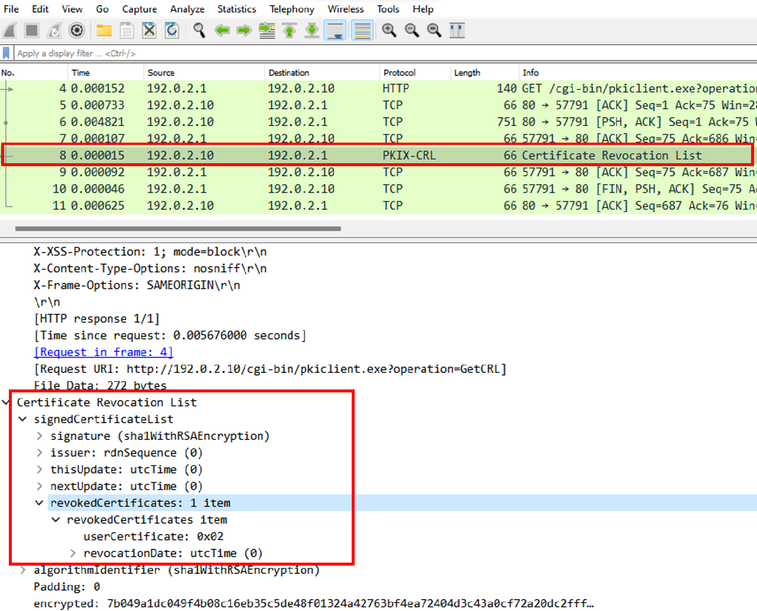
Troubleshooting
Estes comandos podem ser usados para identificar outros problemas relacionados aos certificados:
- No FTD:
debug crypto ca 14- No roteador CA:
debug crypto pki API
debug crypto pki callbacks
debug crypto pki messages
debug crypto pki validation
debug crypto pki error
debug crypto pki server
debug crypto pki transactionsHistórico de revisões
| Revisão | Data de publicação | Comentários |
|---|---|---|
1.0 |
22-Jan-2024 |
Versão inicial |
Colaborado por engenheiros da Cisco
- Angel Sanchez GarciaEngenheiro do Cisco TAC
Contate a Cisco
- Abrir um caso de suporte

- (É necessário um Contrato de Serviço da Cisco)
 Feedback
Feedback